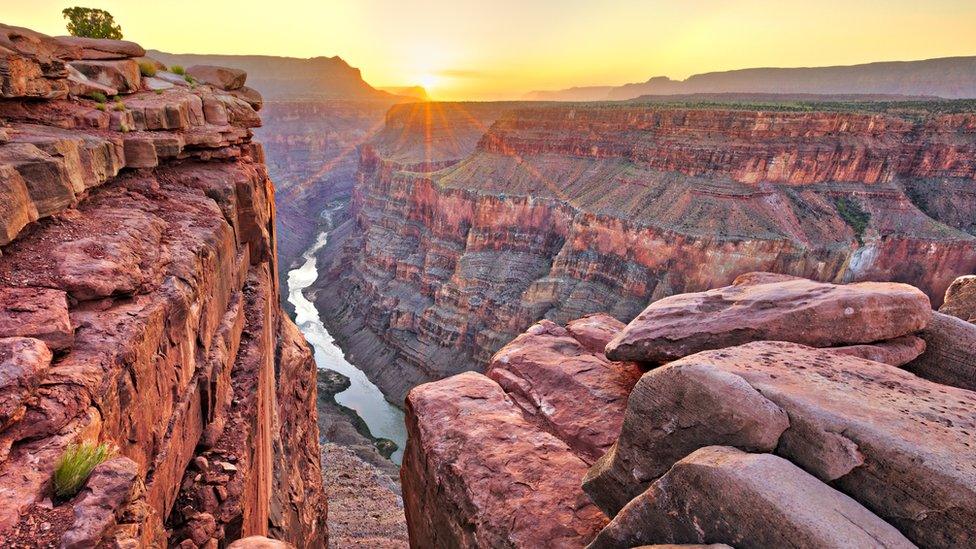Grand Canyon National Park turns 100: 12 facts about the Arizona canyon
- Published
- comments

Today marks 100 years since the creation of the Grand Canyon National Park in Arizona in the US.
It was signed into law by US President Woodrow Wilson on 26 February 1919.
To mark this occasion, here are some facts about one of the world's most amazing natural landmarks.
1. It was formed by water erosion of the Colorado River. It is believed the river made its course through the canyon about six million years ago.
2. The canyon is a massive 277 miles long, 18 miles wide and one mile deep. (It's not the deepest in the world though. That title belongs to the Yarlung Tsangpo Grand Canyon in Tibet, which is two miles deeper!)
3. Because of all the layers of rock visible down the sides of the canyon as the river has eroded away at the land, it is an extremely important place for geological research. It is one of the most studied geological areas on Earth, with rocks dating back almost two billion years.
4. In 1857, an army lieutenant called Joseph Christmas Ives was the first person to explore the canyon.
The layers of rock visible down the sides of the canyon give geologists lots of information about the canyon and how it was formed
5. An expedition in 1871 led by John Wesley Powell gave the world the first reliable maps of the Colorado River. He is also responsible for first using the name we use today - the Grand Canyon.
6. Even to this day, there is more to explore. It is thought there are around 1,000 caves in the canyon, but only 335 of those have been recorded. Only one of these is open to the public - the Cave of the Domes on Horseshoe Mesa.
7. It is divided into the south rim (which is open all year) and the north rim (which is closed in winter).
8. It is an important home to loads of animal species - 373 species of birds, 91 species of mammals, 58 species of reptiles and amphibians, three threatened species (Mexican spotted owl, yellow-billed cuckoo and desert tortoise) and loads more!
9. There is evidence of human presence in the canyon dating back thousands of years. The oldest artefacts found date to the Paleoindian period and are nearly 12,000 years old!
This picture shows John Wesley Powell's boat called Emma Dean, which he named after his wife, on the Colorado River in the Grand Canyon during his second trip through the area
10. Because of the low humidity in the park, there are big differences between the temperature during the day and at night.
11. On 26 October 1979, it was designated a World Heritage Site. This means that you're not actually allowed to pick up chunks of rock and take them home with you as a souvenir, although you can buy them at tourist shops.
12. When it first opened as a National Park, around 45,000 visited it each year. Now, this figure is around 6 million people.
- Published26 February 2019
- Published24 June 2013
- Published2 March 2015
